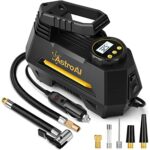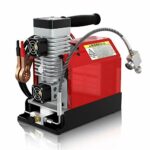The air compressor intercooler’s main function is to cool air before it enters the next stage of compression. Typically, the intercooler is able to cool the compressed air within 20-30 degrees of the ambient air temperature. Moisture from the lower velocity air condensates and separates from the air as it passes through the intercooler.
Air compressor intercoolers are mechanical heat exchangers used to cool compressed air. As air is compressed and driven into the compressor tank the temperature of the compressed air will rise. Consider also that the air receiver, that tank that stores your compressed air before use, and that is located between your compressor and your plant air lines, is also an intercooler of sorts.
Intercoolers remove the heat from the air and feed the engine manifold cooler air for better compression hence the name, the intercoolers have small little fins that channel air and cool it then feeding it to the engine and then also later on after compression spool the turbo or in a super charged engine take a twin screw super charger for example, it would spin the screws and feed air into a intercooler which would cool air and feed it into the intake manifold. A big advantage of the air-to-liquid setup is the lower overall pipe and intercooler length, which offers faster response , giving peak boost faster than most front-mount intercooler setups. Air-to-liquid intercoolers are by far the most common form of intercooler found on marine engines, given that a limitless supply of cooling water is available and most engines are located in closed compartments where obtaining a good flow of cooling air for an air-to-air unit would be difficult.
An intercooler is any mechanical device used to cool a fluid, including liquids or gases, between stages of a multi-stage heating process, typically a heat exchanger that removes waste heat in a gas compressor. An intercooler typically takes the form of a heat exchanger that removes waste heat in a gas compressor. An intercooler is a mechanical device used commonly on turbocharged and supercharged engines for intake air cooling.
Functioning to remove generated heat, air compressor intercoolers and aftercoolers are used in various applications, such as turbo charged and supercharged engines, air conditioners, refrigeration systems and more. Air compressor intercoolers and aftercoolers do the same thing, the only difference is that intercoolers cool air before it gets to the compressor, whereas aftercoolers cool air after it comes out of the compressor. Air compressor intercoolers and aftercoolers are a great investment in the efficiency, long-term functionality, and cost-effectiveness of your equipment.
An aftercooler is also called an intercooler or charge air cooler. Both the terms aftercooler and intercooler are often used interchangeably and they basically serve the same purpose – to cool engine air before it enters an engine’s induction system. Intercoolers of either type work only in conjunction with forced induction engines where there is a substantial difference in temperature between the air that enters the engine and the cooling medium.
what is a air compressor intercooler Related Question:
What are the advantages of providing intercooler in air compressors?
To avoid excessive temperature rise associated with higher compression ratios, and to approach isothermal compression. Saving in power. Volumetric efficiency is increased.
What does an air compressor aftercooler do?
An aftercooler is a mechanical heat exhanger that is designed to remove the heat-of-compression from the compressed air flow and to prep the air so it can then enter a dryer and/or be used in air-operated equipment.
What is the difference between an intercooler and a charge air cooler?
The difference is that a “charge cooler” uses water to cool the air (it is a reverse radiator) and an intercooler uses air as the cooling medium. Since water has a greater heat carrying capacity than air a charge cooler is much smaller than an intercooler.
What is an air to air intercooler?
As the term suggests, an air-to-air intercooler uses the cooling effect of ambient air flowing through the core of the unit to carry away heat, in exactly the same way that radiators use air flowing through the radiator core to shed heat from hot engine coolant.
Why do you need an intercooler?
The intercoolers (Charge Air Coolers) are designed to reduce fuel consumption while increasing the engine power and efficiency. The intercooler’s task is to reduce the temperature of the inlet gas and thus densify the air required which optimises the combustion.
Is intercooler the same as radiator?
A radiator uses a liquid to transfer heat from the source to the atmosphere ,an intercooler typically runs intake air through finned heat exchanger to cool the intake charge from the turbocharger to the intake inlet under pressure.
What’s the difference between and aftercooler and intercooler?
While an aftercooler is a heat exchanger that operates by cooling the air emerging from a compression unit, an intercooler is a device attached to an air compressor that cools the air before engine intake.
What type of equipment is an aftercooler or intercooler?
An aftercooler is also called an intercooler or charge air cooler. They all refer to the mechanical device that sits between the turbocharger/supercharger and the engine and looks like a large radiator.
What are the three types of aftercooler?
Types Of Aftercoolers. The two most common types of aftercoolers are air-cooled and water-cooled. Air-cooled aftercoolers use ambient air to cool the hot compressed air.
Do intercoolers increase horsepower?
It also makes the compressed air denser as it enters the intake manifold, which causes a richer air-to-fuel mix in the engine’s cylinders. The result is increased power output. So, the answer to the question is yes! An intercooler does help to increase horsepower.
What is another name for intercooler?
Here are a few of the nicknames for a charge air cooler: Intercooler. Air-to-air cooler. Air cooler.
What happens if intercooler fails?
If the intercooler fails, the engine won’t receive enough cool, dense air resulting in loss for complete combustion and exhaustion of unburned fuel. Not replacing the intercooler can directly affect horsepower, fuel mileage and emissions.
Which is better air-to-air intercooler or air to water?
Air-to-water intercooler systems can be more expensive than air-to-air systems, but they’re also more effective. Water has roughly 13 times the heat dissipating capacity of air.
Why do Turbos need intercoolers?
Intercoolers increase the efficiency of the induction system by reducing induction air heat created by the supercharger or turbocharger and promoting more thorough combustion.
Are intercoolers worth it?
The main benefit of an intercooler is that it will be less susceptible to heat soaking, which means you can stay out on the drag strip or race track longer without losing power.

